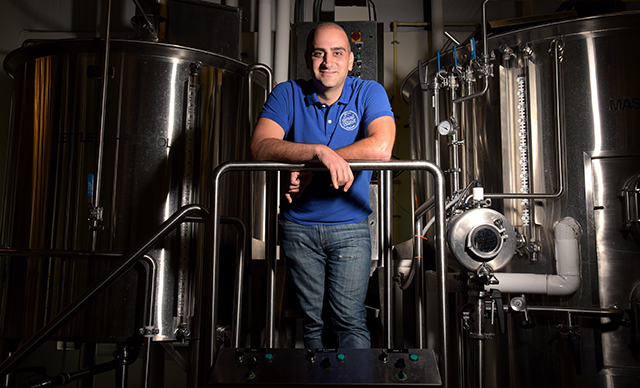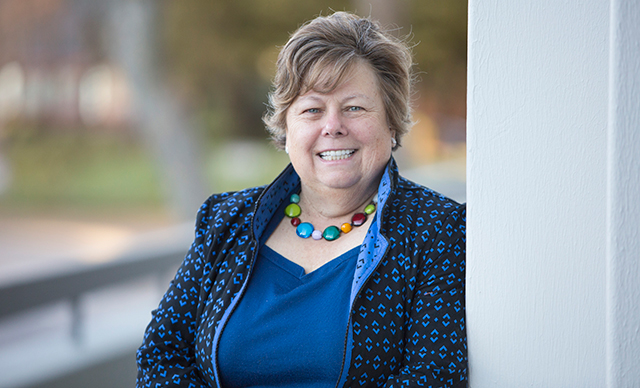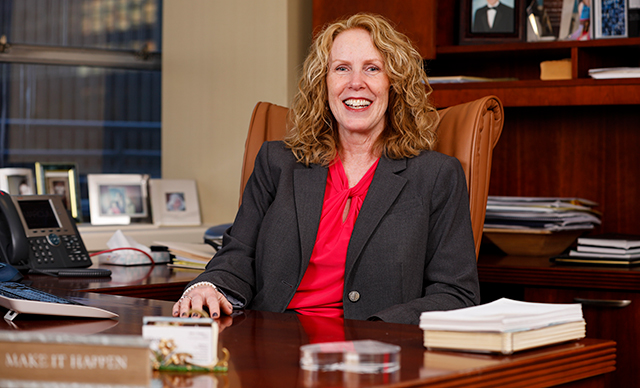- feature
- PRACTICE MANAGEMENT
Developing your own specialized niche practice
Focusing on one type of client can help CPA firms develop unique expertise that distinguishes them from their competition.
Please note: This item is from our archives and was published in 2019. It is provided for historical reference. The content may be out of date and links may no longer function.

Related
Luxury liabilities: Serving high-net-worth clients
COSO creates audit-ready guidance for governing generative AI
Corporate spending accelerating toward AI in 2026
Niche practices are a way firms can distinguish themselves from the competition or offer unique client services. Some firms specialize exclusively on one type of client, while others have a full-service practice but devote more time to certain client categories. We asked CPAs who have developed their own niche practices to share their experiences and provide advice.
RAISE A GLASS
Chris Farmand,CPA/CITP, is the managing shareholder of Chris Farmand & Company, a CPA firm in Jacksonville, Fla., and the CEO of Small Batch Standard. He specializes in financial, tax, and consulting services for craft brewing and distilling industry clients. After working in his family’s CPA firm, he started his own firm and served a large brewery client. In 2010 and 2011, he began to realize the complexities of running a back office in that industry.
“When I asked them who was helping them with these issues, I consistently wasn’t getting any answers. This validated the opportunity,” he said.
While other CPA firms provide tax, accounting, and outsourcing services to the craft beer industry, Farmand’s firm differentiates itself in the consulting area because he knows how to run a brewery’s back office. He began to develop his niche by building his industry and back office knowledge (see the sidebar, “Tips for Developing and Maintaining a Niche Practice,” at bottom of page). To get his name out, Farmand used lists of top breweries and handwrote congratulatory letters to the nominees for the awards. He went to trade shows and beer festivals and talked with business owners who were pouring their beer.
Over the years, he attended as many brewery events as he could. In 2012, he traveled to a craft brewery conference in Denver with more than 5,000 attendees. “I showed up at any business-related session. I raised my hand and answered every question I could by applying accounting and business knowledge to whatever topics were being discussed,” he said. At this festival, he met a brewery owner and developed a personal relationship with this owner, who became a client. He built on his love for people and being on stage, having done comedy and improvisation in his college years, and sought opportunities to speak.
Farmand promoted his business by demonstrating industry thought leadership. Early on, he contacted a craft brewing business website and asked if he could write an article for it. His writing assignments grew, and he got leads from readers. He sent flyers and mailers out to potential clients. When he could not find any industry-specific software, he worked with software companies and helped develop industry applications.
“Building a specialized practice does not come quickly, and it requires patience and discipline,” Farmand said. “There is a lot of risk, but the rewards are so great.” He notes that once CPAs become recognized subject-matter experts in their area, they can charge clients fees commensurate with their expertise.
He has observed changes in the brewery ownership profile over the years and tailored his service offerings in response. “In 2010—2012, many breweries were started by two guys with little business acumen. Then the industry skyrocketed two years later, and they found themselves running multimillion-dollar breweries but weren’t sure what to do next,” he said.
Today, Farmand sees some brewery owners who have a passion for beer as a hobby pursuing breweries as a second career, while others come in with significant funding behind them. “All these owners need advice on how to sustain growth and maintain quality products,” he said. He uses software to extract industry data and develops metrics, benchmarks, and key performance indicators for them.
Farmand’s outreach now is more targeted. “I started out throwing anything against the wall to get clients, but I’m now pursuing the biggest ROI,” he said. “The industry is small and tightknit. My biggest source of new business today is from referrals.”
He emails a newsletter to over 900 readers every other week and uses cold-call marketing and LinkedIn. Farmand continues to write for the industry and posts his articles on his website. A year and a half ago, he developed and launched the Brewery Business Blueprint, an online course for brewery owners that provides suggestions for increasing profitability in the short term and making process changes for long-term growth. He plans to continue to build his course materials.
Farmand said that accounting firms may have to invest significant time and resources in their niche without getting paid for it. The perceived opportunity may not develop, but taking that risk paid off for Farmand. “Many CPAs fear specializing,” he said. “But the more you immerse yourself into an industry, the more work emerges.”
UNTIL THE COWS COME HOME
Gary Genske, CPA, a founder and managing partner of Genske, Mulder & Company LLP in California, has made a career out of serving a specialized niche.
“For 38 years, our firm has specialized in dairy farm accounting and consulting,” he said.
Four decades ago, Genske and Paul Mulder, CPA, worked for a competitor that served less than 5% of the national dairy market. They believed they could do a better job serving clients by specializing in the dairy industry, and in 1981 they formed their own firm.
Over the years, they added staff and grew their practice. They now have four offices in California with more than 80 employees and 23 partners serving large dairy farm customers in 33 states. Today, agriculture clients, primarily dairy, make up more than 90% of their business.
The firm offers accounting and tax services and prepares quarterly reviewed financial statements for most clients. The firm regularly provides consulting services, and its partners are up to date on dairy operations’ issues and developments. The firm prepares and publishes quarterly dairy farm “cost of production” reports to aid in client profitability improvement. These cost studies are posted on the firm’s website. Some of the partners grew up on or own dairy farms, so they have extensive hands-on knowledge.
Name recognition is important in developing a niche practice, and word of mouth was essential for growth. The firm’s partners attend large dairy association trade shows with thousands of participants, publish articles, and seek opportunities to make presentations on relevant industry topics like cost control, tax and estate planning, and succession planning.
The firm’s partners are active and well-known in the industry overall. They participate in not-for-profits that support the industry and testify before Congress on agricultural bills.
The firm recently began a more formal marketing campaign, using an outside agency to improve its branding and identify areas where partners can take the firm to a higher level. Based on the firm’s size and reputation, it may turn down clients whose size or potential billings are not what it is targeting. The firm will occasionally pick up a nonagriculture client in circumstances where it wants to maintain or develop other relationships, such as when they take on a client who is a family member of a farmer. The firm has found that to develop a niche, it is important for everyone in the firm to agree with it and stay focused on it. Because everyone at the firm serves the same pool of industry clients, though, partners need to understand that they work together to try not to compete for the same client prospects.
Genske warned that if a firm relies solely on one industry, economic issues can put pressures on its services and fees. Federal regulation of agricultural prices over the last few years has decreased the prices farmers can charge, and their margins are suffering. As a result, the firm has increased its consulting service offerings to help clients continue to improve their profitability. They are also dealing with client losses due to industry consolidation of small farmers in many states. Although the firm once had a robust compilation and review practice for these smaller clients, the bigger dairies now require audited financial statements. Despite these challenges, it’s rewarding for the partners to look back at what they have accomplished in their area of specialty.
“Our niche practice has grown far beyond our initial expectations through hard work, unpaid long hours, and letting our clients know we care about their success and their industry’s success,” Genske said.

SERVING THE ‘MODERN FAMILY’
Nanette Lee Miller, CPA/CITP, and Janis Cowhey, J.D., accountant and attorney in the Trusts and Estates practice, are partners at Marcum LLP. In 2011, Miller and Cowhey co-founded the firm’s LGBT Services Practice Group to address the needs of same-sex couples and LGBT individuals. Miller and Cowhey are co-leaders of this practice, which has become the Modern Family & LGBT Services Practice Group.
Each had been advising her own clients in these areas — Miller in San Francisco and Cowhey in New York. There were many complex and unique tax and estate planning issues for these clients, with fast-changing rules at both the state and federal levels.
They met at a partner retreat in Florida in 2011 and over drinks started talking about serving the LGBT niche. Cowhey said that although some sole practitioners were providing services in this area, they saw an opportunity for themselves.
“We knew we should do this together and make this a national practice,” she said.
At the time, same-sex marriage was not yet recognized as a constitutional right nationwide; this right wasn’t guaranteed until a 2015 Supreme Court decision. Miller and Cowhey had each been coming up with creative solutions within the tax code for individual clients. Then they pooled their answers so they could use them for other clients who faced similar issues.
They convened a meeting of interested partners and staff throughout the firm and were excited to get a diverse group of people who wanted to be part of this practice. They wrote up a feasibility plan within a week and got quick, strong support from the firm’s managing partner and marketing department.
One of their first accomplishments was the development of a map of the United States that showed, by state, tax filing alternatives for married and single domestic partners. “We put it on our firm website, CNN used it on their website with a link to ours, and soon Fox Business, The Wall Street Journal, and Bloomberg TV all wanted to interview us about it,” Miller said.
In 2012, Marcum launched a dedicated national practice in this area. The firm now provides specialized tax and estate planning and compliance advice to clients across the country, and Marcum is a recognized thought leader in this area. The firm added “Modern Family” to the practice name because it recognized the need to address the unique tax and estate planning needs of common family arrangements like unmarried singles living together, couples in second and third marriages, and others.
To develop a niche, Miller and Cowhey recommend that CPAs get their names out and be authentic. “You have to have expertise, and then you must have a web presence and become searchable,” Cowhey said.
Marcum’s public relations representative contacted local media to get the word out. The partners volunteered for many speaking engagements and participated in trade organizations and associations in their niche. They worked with bankers, attorneys, and mortgage and insurance brokers with similar clients, asking for referrals and providing them in return.
Members of the practice are affiliated with accounting organizations and industry-specific committees across the country and share their expertise. They write articles and develop events where they share relevant new content. “We have a quarterly networking event in New York City called ‘Martinis With Marcum’s Modern Family Group,'” Cowhey said.

Miller and Cowhey warn against CPA firms putting “all of their eggs in one basket” or getting labeled as only a specialist. If a firm offers services only in its area of specialty, the firm is vulnerable to changes that may have a negative impact on its clients or that industry. Miller and Cowhey continue to offer general tax, trust, and estate services, along with assurance and consulting services, to Marcum clients outside of this practice area. They also stress that it is important for CPAs to keep their general skills up to date in addition to staying up to date in their specialized area. “Read constantly, and always look for things in your arena that are interesting that others don’t know about,” Cowhey said. “It’s not just a marketing tool.”
Tips for developing and maintaining a niche practice
Experts say following these strategies can help CPAs and firms establish a successful practice in a specialized area:
- Identify your niche based on your interests, hobbies, and things you enjoy. A niche may fall into your lap, or you may fall into your niche. Become a subject-matter expert in your niche, and establish yourself as a thought leader.
- Before committing to a niche, make sure you have the presence and reputation to specialize, but don’t overextend yourself. You must have enough time to devote to a specialty.
- Find where 20% of your revenue is — a type of client or industry — then spend more time developing business in this area.
- Within the niche, discover a problem and talk about it.
- Firm size does not matter. If you have the reputation and recognition, your firm size will be ignored, but make sure you have partner alignment around the niche.
- It’s hard to be a stand-alone specialist. There needs to be an entrepreneurial culture at the firm and people who are equally passionate about the niche. To identify staff, it is not necessary to recruit those with your niche industry knowledge. Hire smart people and then teach them the industry.
- Once specialized, don’t rely on your reputation and don’t forget about branding and promotion.
About the author
Maria L. Murphy, CPA, is a freelance writer and editor based in North Carolina.
To comment on this article or to suggest an idea for another article, contact Ken Tysiac, the JofA’s editorial director, at Kenneth.Tysiac@aicpa-cima.com or 919-402-2112.
AICPA resources
Articles
- “Focus on Clients, and Revenue Will Follow,” JofA, June 12, 2018
- “CPA Firms: Create a Niche Practice Serving the Emerging Gig Economy,” JofA, June 14, 2017
- “How New CPAs Can Build a Book of Business,” JofA, Dec. 2016


















